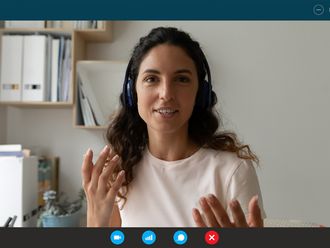
As human beings, we all thrive on social relationships. Therefore, it’s our nature to be socially obliging, and the word ‘no’ is often seen as a threat to the relationships we hold.
When we dole out an instant yes in place of a no, we overcommit our time and energy. This trait is not restricted to one particular gender, although women fall prey more often than men.
For most women, saying ‘yes’ is a socially learned coping mechanism, Dr Noor Amawi, US board certified, clinical psychologist who works at the German Neuroscience Center in Dubai, told Gulf News. Women are often socialised to say ‘yes’ because this makes them more appealing and less aggressive. It also satisfies the need for human connectedness.
Furthermore, women are nurturers and are more likely to empathise and value the need of others.

Women convey sensitivity to interpersonal relationships while men are more career and goal driven. That said, men also encounter self-esteem and self-doubt struggles, which could have the same impact on assertiveness.
“Women convey sensitivity to interpersonal relationships while men are more career and goal driven. That said, men also encounter self-esteem and self-doubt struggles, which could have the same impact on assertiveness,” Dr Amawi told Gulf News.
Mariam Elsayed, an Egyptian expat who has been living in Dubai for the past 22 years and works as a digital manager, agrees that people pleasing is more common among women.

I believe that in certain parts of the world parents tend to bring up their girls to be ‘nice’. The journey to being able to say no is scary because you tend to instantly think of how lonely you would be if you stop saying yes. People pleasers thrive on approvals, and suddenly losing it can be quite unsettling.
“I believe that in certain parts of the world parents tend to bring up their girls to be ‘nice’. The journey to being able to say no is scary because you tend to instantly think of how lonely you would be if you stop saying yes. People pleasers thrive on approvals, and suddenly losing it can be quite unsettling.”

It's not just a woman’s thing, as we think. I've seen both men and women say yes to everything because they feel like their career or social standing is on the line.
“It's not just a woman’s thing, as we think. I've seen both men and women say yes to everything because they feel like their career or social standing is on the line. Saying ‘no’, that doesn’t work for me,” said Lea Katrina Realon, a 32-year-old Filipino expat who has been living in Dubai for the last seven years and works as a brand strategist.
The real deal behind saying ‘no’
Mai Elsayed, a 27-year-old Egyptian expat who works as a clinical hypnotherapist and has been living in Dubai for about 20 years; quoted three main reasons why saying no becomes a real deal.

Saying no is considered a threat only if you come across as rude. Say it with assertiveness, and you’ll see the difference in the way it is received.
1. Cultural expectations
Elsayed said that this could be a vital reason why people find it hard to say ‘no’.
“We teach people how to treat us. The more we allow others to walk all over us, the more we’ll find it difficult to set boundaries. Instead, it is important to teach people what you can and cannot accept. Saying no is considered a threat only if you come across as rude. Say it with assertiveness, and you’ll see the difference in the way it is received.”
Saying yes comes naturally to most of us because we are conditioned to answer in a certain way. We, thereby believe that it is the right thing to do.
Cultural and societal pressures often put us in a spot and we’re therefore torn between saying yes and no in different situations. “Saying yes comes naturally to most of us because we are conditioned to answer in a certain way. We, thereby believe that it is the right thing to do.”
Jonathan Musyoka Muloo, a 41-year-old Kenyan expat who lives in Sharjah and works as a private chef told Gulf News that he says ‘yes’ most of the time in fear of being perceived in the wrong light.

I am learning to say no. I am a work in progress, like most others. In situations where I’m uncomfortable, or unable to explicitly say no, I just stay quiet.
“I am learning to say no. I am a work in progress, like most others. In situations where I’m uncomfortable, or unable to explicitly say no, I just stay quiet.”
2. Niceness
At times we can be too nice for our good. This ‘niceness’ makes us easy targets to be taken for granted, controlled, or even abused.
According to a study published in the Germany-based scientific journal EMBO Reports in June 2020; being agreeable too often at work can lead to overstretched resources, reduced productivity and quality of work, and the feeling of being overwhelmed by too many tasks.
Niceness is not equivalent to accepting or saying yes. I can be nice and still say no. Someone who always says yes, will only come across as one who does not have a strong personality.
“Niceness is not equivalent to accepting or saying yes. I can be nice and still say no. Someone who always says yes, will only come across as one who does not have a strong personality,” added Elsayed.
Dr Amawi added that it’s not necessary to be nice all the time. Being too nice comes with a bag of complications.
In the process of being too nice to others, you tend to become the person you aren’t. This, in turn, can lead to burnout. I treat many clients who reach burnout in their 20’s out of fear of saying ‘no’ at their workplace.
“In the process of being too nice to others, you tend to become the person you aren’t. This, in turn, can lead to burnout. I treat many clients who reach burnout in their 20’s out of fear of saying ‘no’ at their workplace.”
3. Upbringing
How we are raised is a major contributing factor to how we set boundaries; Elsayed told Gulf News. Several factors like parenting methods, cultural exposure, and the environment in which we were brought up, can play a vital role in the person we grow up to be.
In the past, women were not taught to stand up for themselves. But, things have changed now. They are more empowered and have a voice of their own. Similarly, men also go through it in different ways.
“In the past, women were not taught to stand up for themselves. But, things have changed now. They are more empowered and have a voice of their own. Similarly, men also go through it in different ways,” added Elsayed.
According to Emma Burdett, founder of Women in Leadership Deliver (WILD) and a British expat who has been living in Dubai since 2012, the way we are taught to behave, think and act from childhood can infiltrate our adult life.
Most times we end up saying yes even when we mean no, for fear of upsetting others or being disliked.

When I think of my childhood, it's clear to see where people pleasing in girls comes from. If we spoke up we were labeled with the word ‘bossy’. Yet, in contrast, when the boys spoke up they were deemed a leader. These social norms play a role in the system today.
“When I think of my childhood, it's clear to see where people pleasing in girls comes from. If we spoke up we were labeled with the word ‘bossy’. Yet, in contrast, when the boys spoke up they were deemed a leader. These social norms play a role in the system today.”
The importance of setting boundaries
Firstly, setting boundaries is a form of self-love. It will strengthen the relationships you wish to hold on to while letting the superficial ones fall out.
According to a study published in the international Journal of Consumer Research by Professor Patrick and Henrik Hagtvedt, saying ‘I don't as opposed to ‘I can’t’ allowed people to pull themselves out of unwanted commitments. While ‘I can’t’ can often trigger a debate, ‘I don’t’ suggests more about the rules you have set for yourself.

Secondly, learning to say ‘no’ will help you access your priorities, Elsayed told Gulf News.
As humans, we tend to worry about how the ‘no’ will be received. But, it is important to ask yourself who and what your priorities are. Setting boundaries will allow other people to re-evaluate their demands, without making it your responsibility. “Reasonable people will understand when you say a no. And, if someone is unreasonable, then it gives you more reasons to erect a firmer boundary and stay well within it.”
Lastly, saying ‘yes’ all the time can also make you come across as an escapist. As Dr Amawi quoted, saying ‘yes’ provides short-term relief because you avoid disappointing the other person; thereby escaping a possible conflict.
However, the flip side is that you end up feeling more stressed and anxious. Changing this habit will help you assert your needs.
Sachi Kumar, a 27-year-old Indian expat who was born in Dubai and now works as a senior communications manager and a food blogger told Gulf News that the journey from people-pleasers to being assertive is a difficult one.
During her initial years in the digital industry, there were several times when she unknowingly went down the route of saying ‘yes’ beyond her capacity.

I was afraid if I had set boundaries, I would be labeled as the ‘bossy office girl’ and would lose any sort of workplace advantages to my peers.
“I was afraid if I had set boundaries, I would be labeled as the ‘bossy office girl’ and would lose any sort of workplace advantages to my peers.”
So, how does one strike a balance? Here are some tips according to experts:
1. Be assertive
University counselor Eunice Fernandes, a 31-year-old Indian expat who has lived in Dubai for over 5 years and works as a psychologist; conducts workshops on assertiveness on her campus.

I have seen students struggle to stand up to their point of view. They often tend to feel guilty or rude to decline or disagree with one another. Being a ‘yes’ person may lead you to have a lengthy, unreasonable to-do list.
“I have seen students struggle to stand up to their point of view. They often tend to feel guilty or rude to decline or disagree with one another. Being a ‘yes’ person may lead you to have a lengthy, unreasonable to-do list.”
2. Own your decision
Dr Amawi stated that it is important to stand by yourself before you commit your time and energy to someone else.
When you say ‘no’, take responsibility and own your decision. Remember, you deserve the same compassion you show others. So, be kind to yourself.
“When you say ‘no’, take responsibility and own your decision. Remember, you deserve the same compassion you show others. So, be kind to yourself.”
3. Express yourself calmly
Calmness is a sign of strength, quoted Dr Amawi. Express yourself calmly, and with the intention of problem-solving and collaboration.
You are not saying ‘no’ because you are a lousy team player or a bad employee, you are saying ‘no’ because it will impact the quality of your work if you are exhausted and drained.
“You are not saying ‘no’ because you are a lousy team player or a bad employee, you are saying ‘no’ because it will impact the quality of your work if you are exhausted and drained.”

As you grow older, it becomes easier to say no in a manner that will not hurt the other person. This is because you have learned your lessons and you know the consequences of saying yes when you don’t want to.
“We all learn from mistakes, so it is important to make wrong choices. As you grow older, it becomes easier to say no in a manner that will not hurt the other person. This is because you have learned your lessons and you know the consequences of saying yes when you don’t want to,” said Abd Elkareem Hmedan, a Palestinian expat living in Sharjah for the past year, and working as a talent acquisition specialist.












